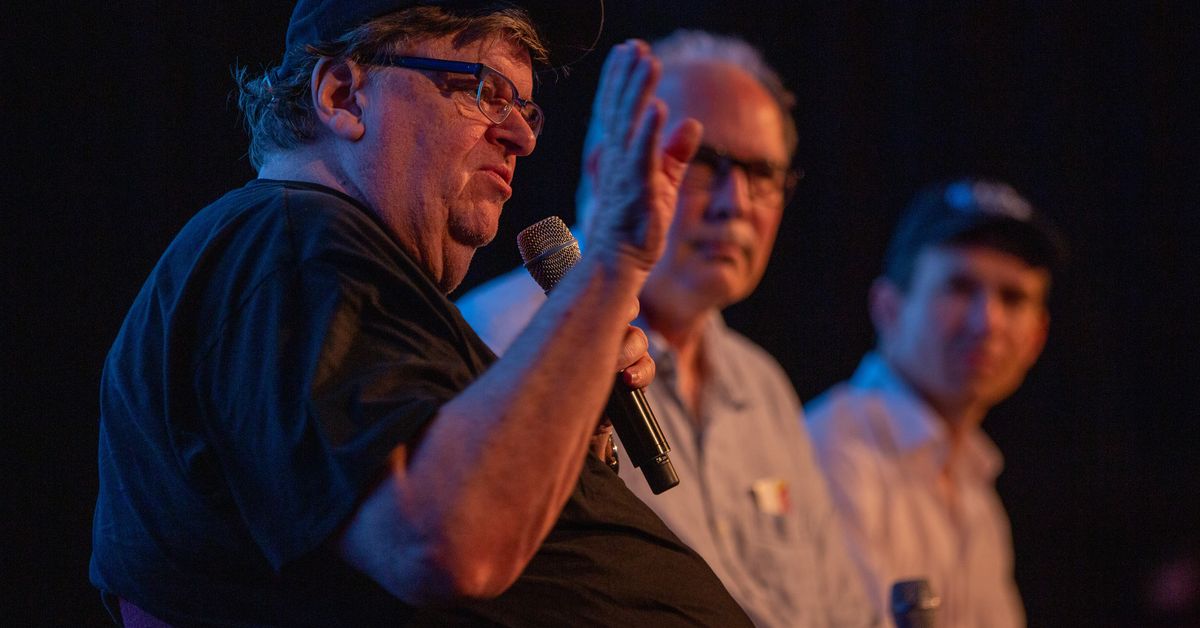
The controversial film Planet of the Humans, produced by Michael Moore, was taken down from YouTube on Monday because of a copyright infringement claim. The complaint was filed by photographer Toby Smith, who was alarmed that his work was used in a film that he doesn’t support, The Guardian reports.
“I don’t agree with its message and I don’t like the misleading use of facts in its narrative,” Smith said to The Guardian. A few seconds of Smith’s video, Rare Earthenware, were used in Moore’s film, which criticizes renewable energy.
“I don’t agree with its message and I don’t like the misleading use of facts in its narrative.”
In a statement to The Verge, director Jeff Gibbs denied any copyright violation in his film, which garnered more than 8 million views on YouTube. “This attempt to take down our film and prevent the public from seeing it is a blatant act of censorship by political critics of Planet of the Humans,” Gibbs wrote. “It is a misuse of copyright law to shutdown a film that has opened a serious conversation about how parts of the environmental movement have gotten into bed with Wall Street.”
Although sources of archival footage are credited at the end of Gibbs’ film, makers of Rare Earthenware say it doesn’t constitute fair use because “the footage has been contorted to represent a pretty un-researched and for that reason rather dangerous narrative.”
The footage depicts the Shiguai coal mine in Inner Mongolia, China, and it’s used in a montage about how solar panels and wind turbines are made. In the context of the film, it seems to be used more as stock footage than an active commentary on Rare Earthenware, which could undermine Planet of the Humans’ case for fair use.
“The longer it stays offline, the better for the amazing work that the environmental movement has been doing in the last 10 years,” says Liam Young, who co-founded the studio that collaborated with Smith on Rare Earthenware. Young and Smith’s film traces the materials used in electronics back to their sources.
‘Planet of the Humans’ has gotten some support from advocates for free speech
Planet of the Humans has gotten some support from PEN America, a group that advocates for free speech. “Those who take issue with the film have every right to make their concerns and arguments heard,” PEN America senior director Summer Lopez said in an April 29th statement. “But first and foremost, the public also has the essential right to view Moore’s film and make their own judgements.”
A firestorm of criticism from influential environmental advocates followed the release of Planet of the Humans in April. Among other things, the film makes the dubious claim that solar and wind power are potentially as harmful to the environment as fossil fuels and that environmentalists are essentially in the pockets of renewable energy corporations. Those claims have been torn apart by environmentalists and scientists who say that the film’s assertions are misleading.
“There is no perfect solution to our energy challenges. But this film does not grapple with these thorny questions; it peddles falsehoods,” Leah Stokes, UC Santa Barbara assistant professor and author of the book on clean energy Short Circuiting Policy, wrote for Vox.
“The weirdly misleading nature of this thing totally explains why it’s on YouTube, nor hosted by Netflix or Hulu or Amazon, or shown in theaters, or released in partnership with a credible news organization,” climate journalist Emily Atkin wrote in her newsletter Heated on April 27th. “YouTube, after all, is a platform that’s been shown to profit off the spread of climate misinformation.”
“The weirdly misleading nature of this thing totally explains why it’s on YouTube”
Stokes called the film “a gift to Big Oil.” It has gotten rave reviews from climate change skeptics like the oil-funded Heartland Institute, which yesterday posted a blog to its website that called Planet of the Humans “an entertaining and educational primer on the hype, phoniness, and lies behind green energy projects.”
The film has already sown distrust within environmental circles. “I have no doubt that many of the people who’ve seen the film are, at the least, disheartened … My work will be at least somewhat compromised and less effective,” Bill McKibben, one of the environmentalists called out in Moore and Gibbs’ film and a founder of the green group 350.org, wrote in Rolling Stone.
Planet of the Humans was also taken down from another platform, Films for Action, because of the copyright claim. Films for Action had previously temporarily removed it following a harsh letter from filmmaker Josh Fox and notable scientists and environmental activists. The full film is still up on Gibbs’ Vimeo account.
